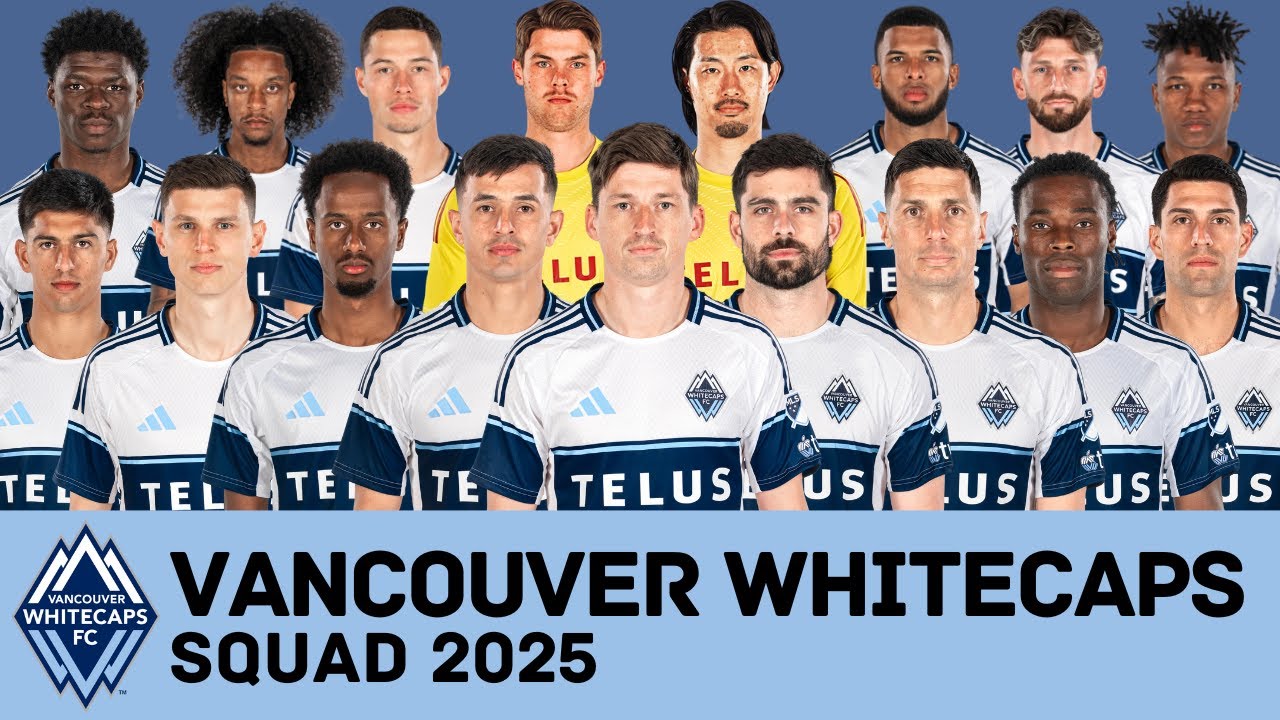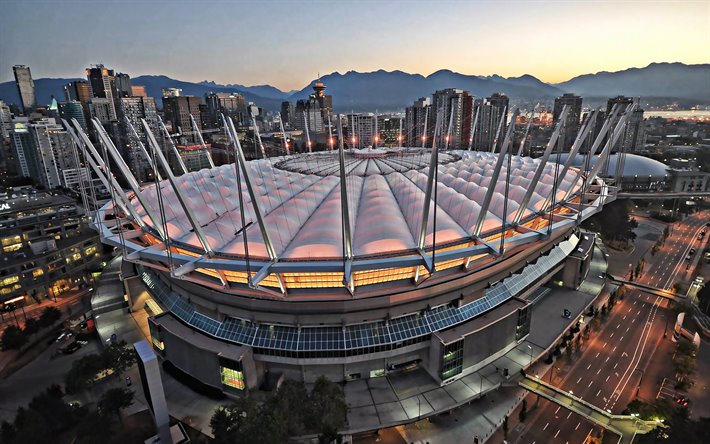MLS
Vancouver Whitecaps: Pioneering Soccer on the Pacific Coast

Vancouver Whitecaps: Pioneering Soccer on the Pacific Coast
Vancouver Whitecaps FC represents one of the most storied and culturally significant soccer franchises in Canada and Major League Soccer. The club, officially joining MLS in 2011, carries a legacy that stretches back to 1974 when the original Whitecaps were founded as part of the North American Soccer League (NASL). Though the modern incarnation is a relatively recent expansion team, the Whitecaps’ history embodies decades of soccer passion, resilience, and cultural influence in British Columbia.
The original NASL team made waves in the 1970s and early 1980s, capturing the hearts of Canadians and establishing Vancouver as a soccer hotbed. The Whitecaps’ crowning achievement during this era was winning the 1979 Soccer Bowl, an accomplishment that still resonates with fans today. Many legendary players, including Bruce Wilson, Bob Lenarduzzi, and Alan Ball, helped build the foundations of soccer culture in Vancouver, inspiring generations to follow the sport. When the NASL dissolved in the mid-1980s, Vancouver soccer persisted through semi-professional and developmental leagues, culminating in the creation of Vancouver Whitecaps FC in the United Soccer Leagues (USL), which eventually became the launchpad for the MLS franchise.
In 2011, Vancouver officially entered Major League Soccer, becoming the third Canadian team alongside Toronto FC and Montreal Impact (now CF Montreal). The expansion into MLS marked a significant milestone, bridging Vancouver’s rich soccer history with modern professional standards. The club’s colors—white, blue, and silver—represent both the Pacific coastline and the city’s snowy mountain backdrop, symbolizing regional pride and natural beauty. The iconic mountain-shaped “Caps” logo evokes Vancouver’s geography and is instantly recognizable across North America.
Vancouver Whitecaps FC quickly established itself as a competitive side in MLS. The club has been recognized not just for its on-field results, but also for pioneering community involvement, youth development, and cultural integration. Vancouver’s approach to building a team emphasizes sustainability, Canadian talent, and a connection to the city’s diverse communities, including significant representation from the city’s large immigrant populations.
Trivia: The Whitecaps’ name is inspired by the snowy mountain peaks surrounding Vancouver, as well as the surf and waves along the Pacific coast. It was also used by the original NASL team, creating a historical continuity that connects generations of fans.
Vancouver Whitecaps: Rivalries
Rivalries are central to Vancouver Whitecaps FC’s identity, providing some of MLS’s most intense and culturally charged matches. The most significant is the Canadian Classique, a rivalry with Toronto FC. This fixture represents the clash between Canada’s largest metropolitan hubs, featuring passionate fans, historic pride, and competitive intensity. Toronto FC has historically dominated the rivalry, but Vancouver’s emerging talent and home-field advantage often create dramatic, unpredictable results. These matches are highly anticipated by fans, and supporters often travel thousands of kilometers to witness the contest.
Another growing rivalry is with CF Montreal, reflecting not only geographic proximity but also national pride. Matches against Montreal are often physical, tactical, and emotionally charged, with both clubs vying for Canadian supremacy in MLS. Fans refer to this series as the “North Clash,” and it carries implications for playoff positioning, bragging rights, and national recognition.
Vancouver’s rivalries in the U.S. conferences are also notable. Matches against Seattle Sounders FC and Portland Timbers have become increasingly important due to proximity on the West Coast and shared Pacific identities. These contests are competitive, frequently drawing large crowds and prime-time broadcasts. The Cascadia influence has extended northward, and Vancouver’s fans are quick to engage in banter, chants, and displays to establish their presence.
Trivia: Vancouver’s supporters group, The Southsiders, was founded in 1999 and predates the MLS team, showcasing decades of soccer enthusiasm. They have been instrumental in building the Whitecaps’ matchday culture and fan identity.
Vancouver Whitecaps: Ownership
Vancouver Whitecaps FC is owned by the Vancouver Whitecaps Football Club Ltd., with Greg Kerfoot and Jeff Mallett among the key stakeholders. The ownership group emphasizes long-term sustainability, investment in youth development, and strong ties to the city’s culture. They guided the club through the transition from USL to MLS, navigating both financial challenges and regulatory complexities.
Ownership has invested heavily in infrastructure, including the development of training facilities and partnerships with local academies. The Whitecaps Academy is a cornerstone of the club’s philosophy, ensuring a pipeline of Canadian talent capable of competing at the highest level. Strategic investments in coaching, scouting, and analytics have allowed the club to remain competitive despite operating in a smaller media market compared to U.S. teams.
The ownership group has also prioritized cultural engagement, integrating the city’s diverse communities into the club’s mission. Vancouver’s demographic diversity—from immigrant families to Indigenous populations—has influenced the team’s community programs, fan engagement, and youth outreach initiatives.
Trivia: Vancouver Whitecaps FC is the first MLS club in Canada to have a fully integrated academy system capable of feeding both male and female youth players directly into professional pipelines.

Watch Vancouver Whitecaps
Vancouver Whitecaps FC plays at BC Place, a world-class stadium located in downtown Vancouver. Opened in 1983 and renovated in 2011, BC Place features a retractable roof, allowing for all-weather matches—a crucial consideration given Vancouver’s rainy climate. The stadium seats 22,120 for MLS matches, providing a vibrant, intimate environment for fans.
BC Place is known for its architectural grandeur, including a striking roof design and advanced lighting systems. The venue is multi-purpose, hosting Canadian football, concerts, and major international soccer events, including FIFA Women’s World Cup matches. This versatility makes it not just a stadium but a civic landmark.
The Southsiders supporters occupy the south end of the stadium, creating a dynamic, loud atmosphere that energizes the team. Flags, chants, and coordinated displays transform BC Place into a fortress, particularly during critical MLS matches and Canadian rivalries. The club’s fan engagement initiatives, such as tailgating zones, youth clinics, and community events, enhance the matchday experience.
Trivia: BC Place was the site of the 2015 FIFA Women’s World Cup Final, where the United States defeated Japan, showcasing the stadium’s capability to host international soccer at the highest level.
Vancouver Whitecaps: This Season
As of 2025, Vancouver Whitecaps FC is consolidating its position as a competitive MLS side. Head coach Vanni Sartini, who assumed leadership in 2022, has emphasized a high-energy, possession-oriented style that blends European tactical influences with North American athleticism. The team’s focus on ball retention, tactical flexibility, and pressing has created an identity capable of challenging both Canadian and U.S. conference opponents.
Key players include forward Brian White, a dynamic and clinical striker capable of converting chances under pressure, and midfielder Ryan Gauld, whose creativity and vision define the team’s attacking tempo. Defensively, Alphonso Davies, though now internationally renowned with Bayern Munich, serves as a symbol of the Whitecaps’ youth development success, inspiring the next generation. Goalkeeper Thomas Hasal has emerged as a reliable last line, combining reflexes with composure.
The 2025 season sees Vancouver focusing on playoff qualification while maintaining competitiveness in domestic cup competitions. Matches against Toronto FC and CF Montreal are particularly high-profile, serving as both tactical tests and cultural showcases. The team’s depth, rotation strategy, and reliance on academy graduates are crucial as the season progresses, particularly given the congested schedule of MLS and international call-ups.
Trivia: Vancouver Whitecaps FC holds the record for most Canadian players developed into MLS professionals from a single academy, highlighting the club’s commitment to homegrown talent.
Vancouver Whitecaps: What to Follow
Several storylines define Vancouver Whitecaps FC’s 2025 and future trajectory. First, the academy system remains central. The club continues to produce players capable of joining MLS and European clubs, reinforcing its role as a talent incubator. Fans should watch emerging talents from Vancouver’s academy, as these players may shape both the first team and the Canadian national squad.
Second, rivalry matches, particularly the Canadian Classique against Toronto FC and the North Clash with CF Montreal, are critical barometers of the team’s growth. These matches provide drama, national attention, and fan engagement, shaping the narrative of the season.
Third, strategic signings will determine long-term competitiveness. Vancouver’s philosophy balances nurturing local talent with selectively adding international players who can provide experience, leadership, and flair. Managing this balance is central to sustaining success in MLS’s competitive landscape.
Finally, cultural and community engagement remains a priority. The Whitecaps continue to promote inclusivity, youth development, and civic pride, ensuring that the club’s influence extends beyond the pitch. This strategy strengthens fan loyalty, generates grassroots support, and positions Vancouver as a benchmark for MLS teams seeking to integrate culture, community, and performance.
Trivia: Vancouver Whitecaps FC’s first MLS home win came against Toronto FC in 2011, a 4-2 victory that set the tone for the club’s early years and solidified fan enthusiasm.
Vancouver Whitecaps FC combines history, culture, and ambition into a unique MLS identity. From its NASL roots to its modern MLS incarnation, the club embodies the Pacific Coast’s soccer tradition while pushing forward with innovative ownership, tactical sophistication, and youth development.
With BC Place as a fortress, a passionate supporters culture led by the Southsiders, and a focus on Canadian talent, Vancouver Whitecaps FC is poised to remain a central figure in both MLS and North American soccer for decades. For fans, players, and the community, the Whitecaps are more than a team—they are a symbol of Vancouver’s enduring soccer legacy.
